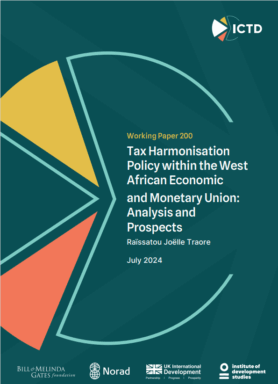Working Paper 200
The West African Economic and Monetary Union (WAEMU) has been engaged in an ambitious project to harmonise its members’ domestic tax systems since 1994. After 30 years, this study aims to highlight the successes and challenges associated with WAEMU’s tax harmonisation policy, and to examine its application in practice.
Although WAEMU has succeeded in establishing a solid normative framework and has achieved its primary harmonisation goals, the success of a tax policy is measured by its actual implementation. In this respect, the results are mixed. It is therefore essential that WAEMU intensifies its monitoring, control, and enforcement mechanisms to ensure better implementation by its member states. At the same time, it needs to update its tax strategy to respond to both member states’ new national challenges and to international challenges – including recent developments in global tax governance.
This paper also highlights certain shortcomings in the tax systems of WAEMU member states. To guarantee the success of tax harmonisation, it is crucial that these states strengthen their tax administrations, improve their efficiency, and limit tax expenditure by rationalising the preferential and incentive regimes that hinder the Union’s objectives and the smooth running of the common market.
Although significant progress has been made, key areas for improvement remain. The paper concludes with a roadmap for WAEMU and its member states, highlighting areas where concerted efforts are needed to maximise the effectiveness of regional tax policy.
